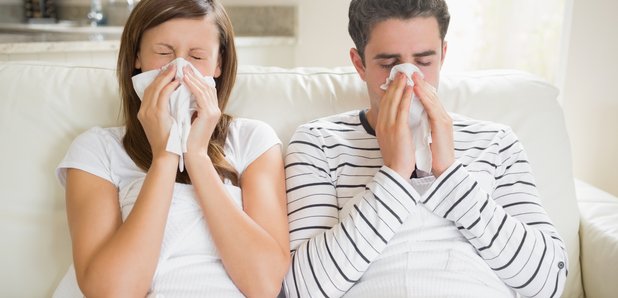On Air Now
Heart's Club Classics with Toby Anstis 7pm - 11pm
13 January 2019, 08:08 | Updated: 13 January 2019, 08:10

It looks like good hand hygiene is helping to lower norovirus rates this year across the South West.
204 outbreaks have been reported in communities across the region so far this Winter, compared with 358 last year.
While it's good news, we're being reminded to be vigilant and practice good hand hygiene at all times to protect vulnerable people from the effects of norovirus.
The infection can live on hard surfaces for weeks and spreads very quickly through environments where lots of people are mingling closely, such as hospitals, schools and nurseries. The best way to protect yourself and others from catching this unpleasant sickness bug is simply to wash your hands thoroughly with warm soapy water, and to keep the environment you live and work in clean.
Alcohol or antibacterial hand sanitisers are a popular choice for people wanting to protect themselves from the bugs that circulate during winter, however most people don’t realise that hand sanitisers are NOT an effective protection against this common sickness bug.
Norovirus is a highly contagious stomach bug that causes diarrhoea and vomiting. Most people will recover within a few days and can return to work or school. However if Norovirus is introduced unintentionally into places where lots of people congregate, such as schools, nurseries, hospitals and care homes, the illness can spread incredibly quickly and affect vulnerable people.
In some situations, Norovirus outbreaks can lead to ward or school and nursery closures.
Dominic Mellon, Consultant in Health Protection for Public Health England South West, said:
“Levels of norovirus are increasing in line with expected levels so far this winter but many schools, nurseries, hospitals and care homes across the South West have reported outbreaks in recent weeks.
“The symptoms of norovirus include suddenly feeling sick, projectile vomiting, and watery diarrhoea. Some people also have a slight fever, headaches, painful stomach cramps and aching limbs. The symptoms appear one to two days after you become infected and typically last for up to 2 or 3 days.
“Anyone who has been infected should stay off work or school for 48 hours after their symptoms have ceased.”
Liz Mearns, Medical Director for NHS England in the South West, said:
“We know there is real pressure on the NHS this winter, so if you have any vomiting, diarrhoea or respiratory symptoms please don’t visit relatives and friends in hospital or care homes. The impact can be huge if you spread norovirus or flu, to patients who are vulnerable or already unwell. In addition to making people unwell, norovirus outbreaks in hospitals can lead to wards having to be closed. This makes it even more difficult for our busy staff and hospitals to care for people at this time of year. Please do your bit this winter to help keep others safe.”